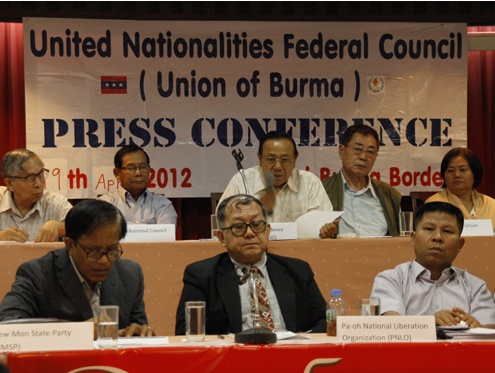Posts Tagged ‘Thai Army’ (3 found)
Unity Must Prevail
 After its organizational conference held on a Thailand-Burma border area, disagreements between the United Nationalities Federal Council (UNFC) and the Karen National Union (KNU) has led to the KNU suspending its’ membership of the UNFC, a setback for the peace process. While this strikes a blow into the government engineered narrative that the peace process is making substantial progress, it is particularly worrying for the ethnic communities that have been suffering from this conflict for decades.
After its organizational conference held on a Thailand-Burma border area, disagreements between the United Nationalities Federal Council (UNFC) and the Karen National Union (KNU) has led to the KNU suspending its’ membership of the UNFC, a setback for the peace process. While this strikes a blow into the government engineered narrative that the peace process is making substantial progress, it is particularly worrying for the ethnic communities that have been suffering from this conflict for decades.
Ostensibly, disagreements over organizational structure have caused this rift, although there are also disagreements within the KNU leadership itself over its position in the UNFC, leading to fears of a split within what has traditionally been the most prominent ethnic armed group. Previous Burma regimes have used divide and rule tactics to weaken armed resistance and to sabotage ethnic unity and it is imperative that this does not happen now. As ethnic leaders squabble over leadership structures, surely much to the delight of the leaders of the Burma Army, it is the most vulnerable populations who feel the pressures, while the government manages to convince elements of the international community that a peace settlement is just around the corner. It is crucial that whatever reason for the KNU’s withdrawal from the UNFC, they must put the ethnic communities at the forefront of their decision making […]
• • •Thailand/India/Indonesia: Rohingyas at risk need protection
Hundreds of Rohingyas fleeing systematic persecution in Myanmar require immediate assistance from Thailand, India, and Indonesia […]
• • •Open Letter: Thailand must respect principle of non-refoulement and protect the rights of refugees
Your excellencies,
The International Federation for Human Rights (FIDH) and its member organisations, the Union for Civil Liberty (UCL) and the Alternative ASEAN Network on Burma (Altsean-Burma), are deeply troubled by the actions of the Thai Army and border police to force at least 166 refugees back to Burma on 25 December 2010. These refugees fled their home villages in southeastern Burma due to armed clashes between the Burma’s military forces and ethnic rebels […]
• • •








 All posts
All posts